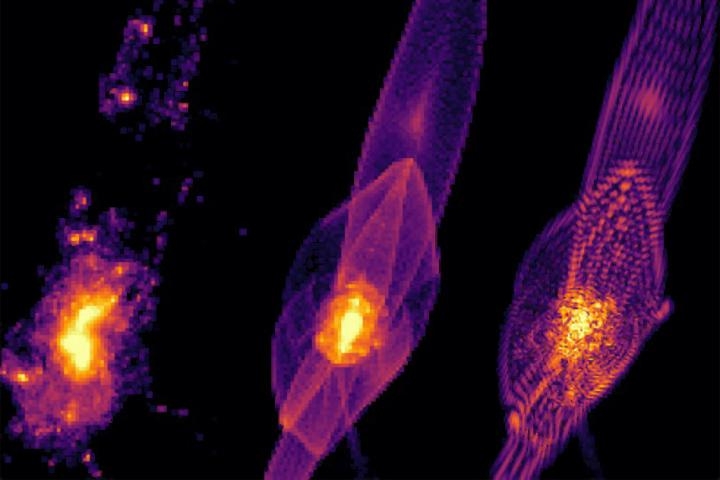The Cosmic Companion October 5, 2019
A cluster of galaxies seen from the early Universe, organic material rising from the geysers of Enceladus, and fuzzy dark matter
Hello everyone!
What an interesting week it was in astronomy news! Astronomers discovered previously-unknown galaxies in a cluster from the early Universe, organic material was detected erupting from the geysers of Enceladus around Saturn, and a new idea suggests dark matter could be fuzzy.
Let’s take off!
The Week in Space
Galaxies from the Early Universe Found in Galactic Cluster
New members of a protocluster of galaxies, 13 billion years old, have been seen for the first time. What do we know about this family of galaxies from the ancient Universe?

The 12 galaxies now know to exist in the z660D cluster of galaxies. Image credit: NAOJ/Harikane et al.
New galaxies in an ancient cluster have been detected by astronomers using an array of instruments, including the Subaru, Keck, and Gemini Telescopes. This protocluster of galaxies, 13 billion years old, is the oldest such grouping ever found. At the time this protocluster formed, the Universe was the 800 million years old, just six percent of its current age.
In the modern Universe, galaxies clusters can contain hundreds or thousands of members, but how these structures form remains a mystery. In order to better understand contemporary clusters, astronomers carefully study protoclusters, dense systems of dozens of galaxies in the ancient Universe.
Read more: http://bit.ly/z66OD
Organic Materials Erupt from Geysers on Enceladus
Building blocks of amino acids were seen erupting from geysers on Enceladus, orbiting Saturn. What could this finding mean in the search for life in the Solar System?

A artist’s concept of an image of geysers erupting from the south pole of Enceladus. Image credit: NASA/JPL-Caltech
Orbiting Saturn, the icy moon Enceladus is home to numerous active geysers, which regularly erupt with plumes of water and rocky material. While some of the water released from these vents falls across the surface of that world as snow and ice, a portion soars into space. A new study shows organic compounds, essential to the formation of amino acids, are mixed in with the material erupting from these vents.
Given energy and a favorable climate, these organic compounds could form amino acids. The energy required to form these molecules on Earth is supplied by hydrothermal vents on the ocean floor. Researchers speculate the geysers that feed the vents on Enceladus might provide the energy needed to drive the formation of amino acids on Enceladus.
Read more: http://bit.ly/Organic-Geysers-Enceladus
Is Dark Matter Fuzzy?
Dark matter is believed to be an underlying reason for the formation and development of galaxies in the early Universe. But was this dark matter cold, hot, or fuzzy?

Simulations of how galaxies would form in the early Universe if dark matter were (left to right) cold, hot, or fuzzy. Image credit: Universities of Princeton, Sussex, Cambridge
Dark matter is makes up nearly 85 percent of the “matter” in the Universe, but it cannot be seen. Also, it does not give off heat, nor does it emit radio waves. The only way it can be detected is by the substantial effect gravity from dark matter has on normal matter — stars, galaxies, and everything else normally associated with the Universe around us. Astronomers can see the effects of this strange effect within galaxies, as well as between families of stars.
If dark matter did not exist, stars would fly away from galaxies, and galaxies themselves would not hold together in clusters. Dark matter also played a significant role in forming galaxies as these structures first formed in the early Universe.
Read more: http://bit.ly/Is-Dark-Matter-Fuzzy

Coming soon: The First Woman on the Moon: The Past and Future History of Women in Space by James Maynard
Thanks for reading! If you want to keep up with the latest updates and news about astronomy and space exploration, visit www.thecosmiccompanion.com, join our Facebook page, and follow @TheCosmicCompanion on Instagram and @CompanionCosmic on Twitter.
Do you know someone else who would love this newsletter? Please share!
Astronomy - Don’t Leave Home Without It!
- James


